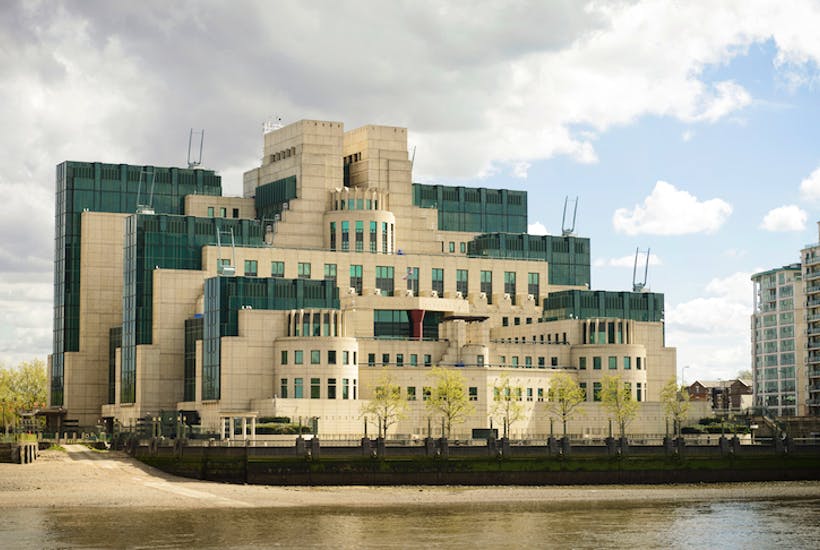I might be feeling more confident about the government’s decision to give Huawei a limited role in building Britain’s 5G network, ‘on the advice of intelligence agencies’, were I not reminded of the effectiveness of British spooks by the recent appearances of Alexandre del Valle on French radio.
Del Valle is the author of numerous books on Islamism and the Middle East, a knowledge accrued over many decades, including a spell in the late 1990s working for France’s General Secretariat for Defence and National Security, an inter-ministerial body answering to the Prime Minister.
His latest book, The Project, explores how the Muslim Brotherhood has successfully spread across the West, and to promote the book he’s been giving a series of media interviews. One of them was a couple of days after Usman Khan’s murderous rampage across London Bridge. It was too soon to discuss that atrocity in detail but del Valle talked at length about how the French intelligence services despaired at Britain’s disastrous complacency towards Islamic extremism in the 1990s.
‘I remember talking to a member of MI5 when I was part of the intelligence-sharing network on terrorism,’ explained del Valle. ‘I was stupefied. Over the course of an hour in 1996 he talked of his pride that his country had welcomed some of the worst Islamists in the world, in order to keep them under surveillance, and so there will never be an attack. We saw the result.’
As part of this conciliatory strategy British courts refused requests from France to extradite Rachid Ramda to face charges of involvement in the Armed Islamic Group’s attack on the Paris transport network in 1995 that killed eight people. There was fury in France at what they regarded as their ally’s appeasement of Islamic extremists.
Britain, declared French anti-terrorism prosecutor Irene Stoller in 2002, ‘clearly does not want problems with the radical Islamists on its soil… just imagine the reaction in Britain if France held on to someone accused of killing eight people on the London underground.’
Three years later Islamists targeted the London Underground and within months Britain proceeded to extradite Ramda to France, where he was convicted and sentenced to ten years’ imprisonment.
Deriding the naivety of the British in believing the most effective approach to Islamic extremism was by playing the benevolent host to its ringleaders, del Valle said: ‘The Jihadist network was tolerated until the attack in London in 2005. Fifty deaths later, the United Kingdom learned to its cost that its pro-Islamism was no longer a protection.’
The London bombing was a terrible lesson for the UK political elite. For years they had played down the threat from radical Islam, telling us that we had nothing to fear. And then July 2005. ‘The rules of the game have changed,’ admitted Tony Blair after the attack. ‘We’re angry about these extremists. We’re angry about what they’re doing to our country.’
At the same time that Ramda was being sent back to France, another notorious figure was finally set to face justice – Abu Hamza, the imam of the Finsbury Park Mosque in the late 1990s. Despite warnings from informers and foreign intelligence agencies about Hamza, he had remained a free man for years. The tabloids nicknamed him ‘Captain Hook’ on account of the hand he had lost allegedly fighting Soviet forces in Afghanistan, and for some he was a figure of fun; but there was nothing light-hearted about the venomous anti-Western sermons he preached.
It took the Americans to bring an end to his terrorist activities by demanding his extradition in 2004 and Hamza is now serving life in a maximum security prison after being found guilty on 11 charges of terrorism and kidnapping.
So forgive my scepticism at the breezy assurances we’ve heard in the last 24 hours about how Boris and the boffins at GCHQ have everything under control. Apparently the PM gave the green light to Huawei because Britain’s position is ‘different from any other country, thanks in part to its superior intelligence agencies’. Today’s Daily Telegraph quotes a Whitehall insider boasting: ‘The fact is, GCHQ knows more about Huawei than America’s National Security Agency. We can manage the risk; other countries can’t.’
Spooks in France of a certain age must have a sense of deja vu after all this British braggadocio. They heard something similar in the 1990s, and while this risk is of a different nature, the confidence of the British PM and his intelligence agencies is the same. We can only hope that this time the confidence is not tragically misplaced and that a quarter of a century from now we will be wondering how we could have been so stupid to welcome an enemy into our midst.







Comments